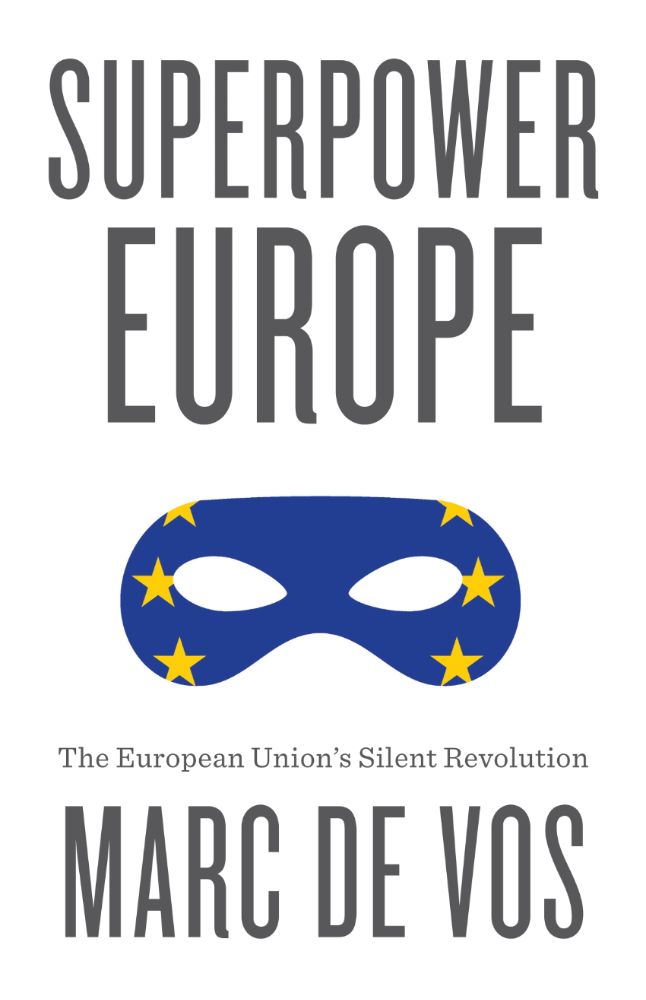Marc De Vos’s Superpower Europe arrives at a pivotal moment in the history of the European Union. Recent years of polycrisis have completely transformed how the EU thinks and acts. In his new book, De Vos shines a light on the EU’s “silent revolution” and its metamorphosis into a global superpower on par with the United States.
“The new EU shares with the USA a geopolitical, industrial, technological and defence mission that is tailored to a new world order characterised by superpower conflict,” he writes. “In this, Brussels is Europe’s Washington, DC.”
Heady stuff. Is the EU really setting the beat in Europe? De Vos thinks so, insisting that “the anonymous, underestimated and misunderstood EU is experiencing something of a heyday.” So what’s behind this shift?
According to De Vos, a professor at Ghent University in Belgium and co-CEO of the Brussels-based Itinera Institute think tank, a series of crises have pushed the EU towards greater unity and strategic autonomy. The climate emergency, the Covid-19 pandemic, Russia’s invasion of Ukraine, and the emerging cold war with China have exposed the EU’s vulnerabilities but also highlighted its potential as a cohesive force capable of responding to global challenges.
This is the silent revolution that has transformed the EU from an economic union into a key geopolitical player. De Vos argues that the EU has quietly achieved superpower status in a new world order, a view that sets him apart. Prevailing opinion suggests the EU’s influence on the global stage is waning. But De Vos presents his arguments convincingly in this easy-to-digest read.
 Marc De Vos maps out the EU’s metamorphosis from a union of values to a union of power.
Marc De Vos maps out the EU’s metamorphosis from a union of values to a union of power.
“Europeans may realise it too little and the rest of the world may barely see it, but a new superpower has already been born: the good old, dull, grey and elusive EU,” he writes.
The evolving identity of the EU is one of the book’s central themes. De Vos maintains that the traditional view of the EU as a community of values has transformed into what he describes as a “geostrategic coalition.”
The EU, he writes, has become a state project that plans, regulates, subsidises and bureaucratises, and comprises a migration union aimed at erecting and protecting external EU borders. He argues that geopolitical conflict is likely to be with us for the rest of the century – and the EU will “need to carry the torch for Europe.”
De Vos doesn’t shy away from uncomfortable truths and addresses the tension between national sovereignty and European solidarity. He highlights the delicate balance the EU must maintain to navigate internal divisions while fostering a sense of collective identity.
De Vos also makes a compelling case for the EU’s strategic autonomy. To maintain its fledgling superpower status, he argues, the EU must move beyond its traditional reliance on soft power and develop a robust defence and security policy. This includes investing in military capabilities and technological advancements to safeguard its interests.
Economic resilience and innovation are also key. The DNA of the old EU, he writes, was to separate politics from economics. However, the new EU is tilting from market capitalism to state capitalism, focusing not on free-market forces but on state control and state intervention. The book emphasises the importance of state capitalism and industrial policy in fostering economic growth and competitiveness.
A new superpower has already been born: the good old, dull, grey and elusive EU.
When it comes to examining the political machinations of the EU, De Vos doesn’t pull his punches: “The EU needs fewer top officials – fewer presidents and fewer commissioners in its Commission – with more democratic recognition as a result, more strategic, operational, governance and policymaking capacity, less complex decision-making, less decision by unanimity and more decision by majority.”
It's a bold vision, but De Vos isn’t finished there. The EU, he writes, must “rediscover and redefine itself in a way that makes sense not only to its member states but also to the rest of the world if it is to avoid a crisis of legitimacy.”
Helpfully, De Vos posits five suggestions (or “beacons” as he calls them) that could help consolidate the EU’s transformation into a global superpower. First, he proposes a flexible, tiered membership model to allow countries to integrate with the EU in stages – focusing on areas such as security, trade and energy.
His other points tackle building a defence union; strengthening the single market; increasing European resources; and plans to “institutionalise and democratise the new EU.”
De Vos’s message is clear: the EU has evolved from a post-war peace project to a geostrategic coalition; from a union of values to a union of power; and from a market project to a state project. Underestimate it at your peril.
Sign up to The Parliament's weekly newsletter
Every Friday our editorial team goes behind the headlines to offer insight and analysis on the key stories driving the EU agenda. Subscribe for free here.